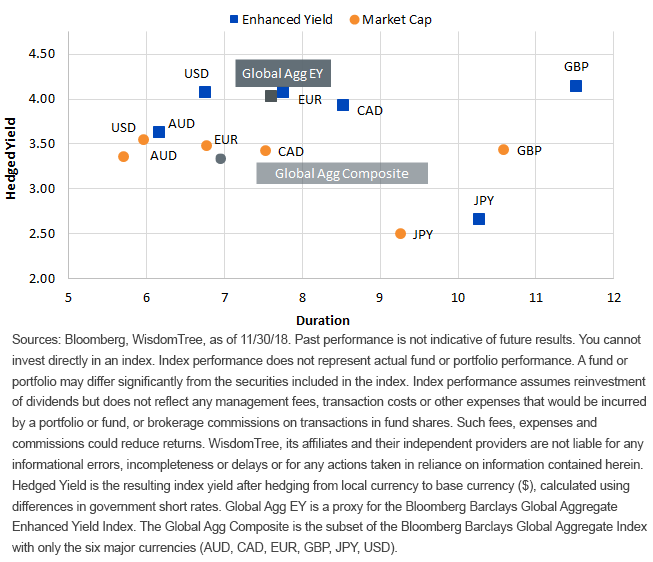GLBY: A Global Approach to Enhanced Fixed Income



In our view, market capitalization-weighted fixed income portfolios seldom make sense. In 2015, WisdomTree helped create a strategy that sought to enhance the income profile of the Bloomberg Barclays U.S. Aggregate Index. Today, we bring that same underlying methodology to global fixed income markets. Below, we introduce our approach and show how going global can mean much more than simple diversification.
A History of Enhanced Yield
With the launch of our first yield-enhanced strategy more than three years ago, we pioneered a Modern AlphaTM approach for allocating to the U.S. investment-grade bond market. In our view, investors should own the market broadly, but enhance yield by tilting toward different sectors/maturities (while applying strict risk constraints).
In global markets, the opportunities for yield enhancement can be even greater since you have another lever to pull via additional countries and currencies. However, given that many developed markets have lower interest rates than the U.S., won’t investing globally dampen income? In short, we believe the answer is no. By hedging global bonds to U.S. dollars, there is typically an attractive yield pickup due to the significant difference between developed short rates. This also can significantly reduce the volatility of international investing for U.S.-based investors.
For many investors, the Bloomberg Barclays Global Aggregate Index (Global Agg) serves as the most recognized benchmark for global fixed income returns. To construct our approach, WisdomTree worked with Bloomberg to focus on the same investable universe but boost potential income via our enhanced yield weighting methodology.
The WisdomTree Yield Enhanced Global Aggregate Bond Fund (GLBY) employs a systematic, rules-based approach to enhance yield not only at the country level, but also at the global level, by taking advantage of opportunities between currencies. The construction process also maintains a disciplined risk management process through currency hedging, tracking error constraints and sector and interest rate caps to broadly maintain the risk characteristics associated with a globally diversified portfolio.
Enhancing Income Potential of Global Fixed Income
To review, yield typically can be increased by shifting exposure along any of a number of risk dimensions, including sector exposure (Treasury, government-related, corporates, securitized), interest rate risk (duration), credit risk and currency risk.
Yield and Duration Comparison, November 30, 2018

For definitions of terms in the chart, please visit our glossary.
The Global Agg provides a variety of opportunities for income globally:
- Enhancing yield across currency blocks
- Over-weight currency blocks with higher net yields and under-weight currency blocks with lower net yields
- Enhancing yield within currency blocks
- Across the yield curve, debt guaranteed to governments tends to have the lowest levels of yield per unit of interest rate risk.
- Next, securitized debt or bonds backed by a pool of receivables such as mortgages can provide a modest lift in yield in exchange for the slightly higher probability that the borrower may default.
- Finally, investment-grade credit can provide an additional increase in yield compared to credit risk-free Treasury debt.
In our view, many investors may fail to realize that the Global Agg could provide greater opportunities for return once they take a closer look at the individual components. However, if investors simply allocated based on yield, the portfolio could be significantly over-weight credit and interest rate risk. In our view, this naïve approach to fixed income may do little to enhance an investor’s prospects for return.
Looking at the Results
Through our approach to the Global Agg, when a variety of constraints focused on risk management were applied, the output of the index methodology resulted in a portfolio with an additional 69 basis points (bps) of income potential that retained a similar interest rate risk profile to that of the Global Agg. This incremental yield advantage is typically achieved through increased exposure to higher-yielding currencies and corporate bonds. The implementation of relative currency, sector and quality constraints, however, also helps the Index preserve the diversification potential of a broad-based, core fixed income strategy.
There’s an Exchange-Traded Fund (ETF) for That
With the launch of GLBY on December 13, WisdomTree packaged this unique approach in an ETF with an expense ratio of just 20 bps. By searching for income in the global investment-grade universe, GLBY could represent a step forward for investors looking to generate greater income potential while broadly retaining the risk characteristics of familiar core fixed income portfolios.
Important Risks Related to this Article
There are risks associated with investing, including possible loss of principal. Fixed income investments are subject to interest rate risk; their value will normally decline as interest rates rise. Fixed income investments are also subject to credit risk, the risk that the issuer of a bond will fail to pay interest and principal in a timely manner or that negative perceptions of the issuer’s ability to make such payments will cause the price of that bond to decline. Investing in mortgage- and asset-backed securities involves interest rate, credit, valuation, extension and liquidity risks and the risk that payments on the underlying assets are delayed, prepaid, subordinated or defaulted on. Due to the investment strategy of the Fund, it may make higher capital gain distributions than other ETFs. Please read the Fund’s prospectus for specific details regarding the Fund’s risk profile.
BLOOMBERG® is a trademark and service mark of Bloomberg Finance L.P. and its affiliates (collectively “Bloomberg”). BARCLAYS® is a trademark and service mark of Barclays Bank Plc (collectively with its affiliates, “Barclays”), used under license. Bloomberg or Bloomberg’s licensors, including Barclays, own all proprietary rights in the Bloomberg Barclays Indices. Neither Bloomberg nor Barclays is affiliated with WisdomTree, and neither approves, endorses, reviews or recommends GLBY. Neither Bloomberg nor Barclays guarantees the timeliness, accurateness or completeness of any data or information relating to the Bloomberg Barclays Global Aggregate Enhanced Yield Index, and neither shall be liable in any way to WisdomTree, investors in GLBY or other third parties with respect to the use or accuracy of the Bloomberg Barclays Global Aggregate Enhanced Yield Index or any data included therein.
Diversification does not eliminate the risk of experiencing investment losses.



